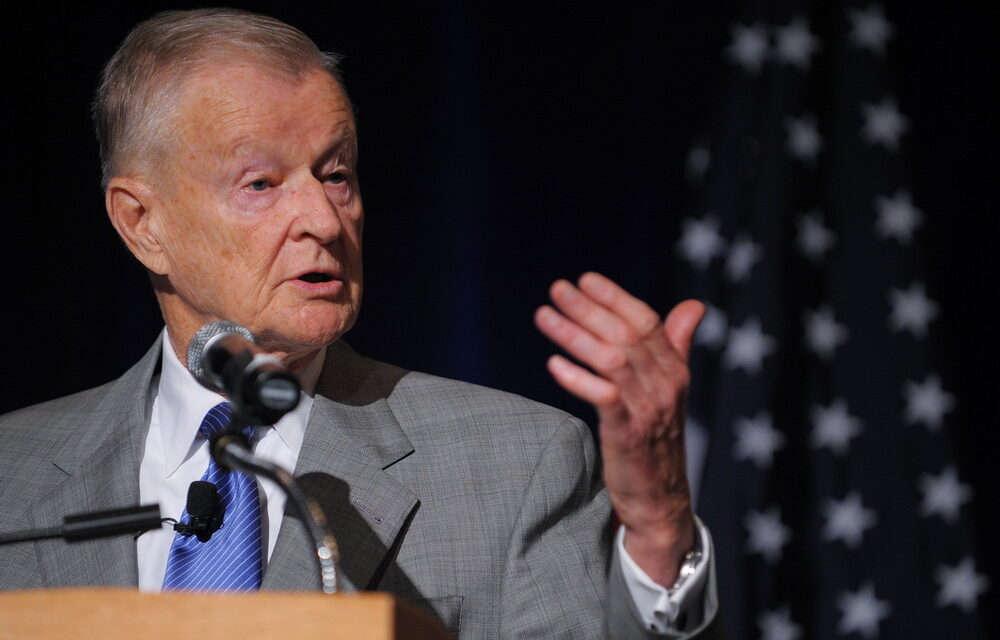Zbigniew Brzezinski wrote his geopolitical analysis titled The Great Chessboard in 1997, so roughly a quarter of a century ago, when America had just won the Cold War, the Soviet Union had disintegrated and Russia, which considered itself the heir of the Soviet Union, was still weak, both economically and politically , meaning by the latter that in the circles of the Russian elite, different ideas regarding the relationship to the West and the imperial past were still wrestling with each other.
At this moment, the United States is the world's only global power, and Brzezinski wonders how that unique opportunity could be used to ensure that America retains its leading role in the future, even when the world will change significantly, since China has its own with its economic growth of 10 percent per year, through which - if this pace is maintained - China's economic power will exceed that of the United States, and Russia may once again aspire to a role as a world power.
In addition, Brzezinski also reckons that America will become increasingly weak both externally and internally in the future. For most of the 20th century, America alone accounted for 30 percent of the world's GDP, and this ratio reached 50 percent at the end of the Second World War, and it was also far and away the world leader in technological development. In the future, America's weight in the world's GDP will decrease significantly, and although it will retain its leading position in the technological competition, other countries will catch up in this regard as well. Moreover, as America becomes more and more a multicultural society due to the different motivations of each social stratum, it will be increasingly difficult to form a consensus on foreign policy issues, unless there is a really strong and widely perceived direct external threat.
Cultural changes are also unfavorable. The sustained exercise of real imperial power abroad requires a high degree of indoctrination, intellectual commitment and patriotic enthusiasm. However, the country's dominant culture is increasingly based on mass entertainment, which is largely dominated by hedonistic themes that are wary of social conflict. This makes it more and more difficult to create the necessary political consensus regarding external actions that require lasting sacrifices. Polls already show that only a tiny minority of Americans (13 percent) support the proposition that "as the only remaining superpower, the United States should continue to be the world's number one leader in solving international problems." The vast majority (74 percent) would prefer America to "take a fair share of solving international problems together with other countries."
In this situation, it is America's task to forge an appropriate relationship with the successor of its former - and now collapsed - rival, the Russian Federation, and with China, which is rising and can certainly be considered a new challenger.
It must be made clear to the Russian political elite that Russia's first priority is its own modernization, not vain efforts to regain its former status as a world power. Given the country's enormous size and diversity, a system based on decentralized and free market principles would more likely allow the creativity of the Russian people and the country's vast natural resources to be harnessed. Such a more decentralized Russia, on the other hand, would be less susceptible to imperial mobilization. A loosely confederated Russia—consisting of a European Russia, a Siberian republic, and a Far Eastern republic—could more easily cultivate closer economic ties with Europe, the new states of Central Asia, and the East, which would accelerate Russia's own development.
Russia's clear choice of the European option over the imperial option will be more likely if America successfully implements the second important line of its strategy regarding Russia: namely, the strengthening of geopolitical pluralism in the post-Soviet region. This means that closer relations must be built with the newly independent states, especially Ukraine, which already defines itself as a Central European state and strives for closer integration with the West. Similarly, relations with strategically key Central Asian states such as Azerbaijan and Uzbekistan should be strengthened, gradually opening these countries to the world economy.
The realization of these goals would be facilitated by an increasingly extensive Europe and an expanded NATO. The expansion of NATO and the European Union would serve to strengthen Europe's increasingly fading sense of professionalism, while consolidating the democratic achievements achieved by the successful end of the Cold War to the benefit of both America and Europe. The new Europe is still being formed, and if this new Europe wants to remain geopolitically part of the "Euro-Atlantic" area, the enlargement of NATO is essential. If one has to choose between a larger Euro-Atlantic system and a better relationship with Russia, the former should be incomparably more important to America.
Brzezinski reckons that America's unprecedented power will decline over time, so America's task is to influence the rise of other regional powers in such a way that they do not threaten its global primacy. This applies above all to the relationship with China. Geopolitical pluralism, i.e. securing American influence in the Eurasian region, will not be possible without a strategic understanding between America and China. To this end, it is America's duty to remove any uncertainty about America's commitment to a China policy, lest the Taiwan issue sour and damage relations with China.
America's main ally in the Asian region is Japan. According to Brzezinski, Japan cannot become a dominant regional power due to the strong regional antipathy toward it, but it can be a leading international power and play an influential role globally by cooperating closely with the United States in solving global problems. But Japan cannot be America's unsinkable aircraft carrier in the Far East, nor America's top Asian military partner or potential Asian regional power. The geopolitical stability of the Asian region could best be ensured in a tripartite system that includes America's global power, China's regional supremacy, and Japan's international leadership role.
In summary, Brzezinski imagines the multipolar world in such a way that America's dominant position will last for at least another generation, but if possible even longer, and in the midst of changes in global power relations, it will distribute responsibilities among regional and international actors in such a way as to ensure geopolitical stability.
In the 2022, fifth edition of his book, there is also an epilogue written for the work, which he wrote in 2016, less than a year before his death, but already after the 2014 revolution in Ukraine and the occupation of Crimea by the Russians. He condemns Putin, but continues to stand for the need to bring Russia into the reach of the West, and similarly, recognizing that China is a rising power in the world, he encourages America to responsibly make Beijing play a greater role in maintaining world order, not only in the Pacific Ocean, but also in the Middle East. -Also in East and Central Asia.
Finally, he concludes the epilogue by saying, "What the world needs today is not an America that is content with unilateral wars, but a global superpower that recognizes the transitory nature of its unique position and therefore seeks to establish a multipolar world order."
However, Brzezinski's multipolar world order is one in which the scope of global and regional actors would be determined by Washington, except that there may be different opinions in Moscow and Beijing.
Previous parts of the big chessboard series:
The author is an economist
Source: Magyar Hírlap
Photo: MANDEL NGAN | Source: AFP













